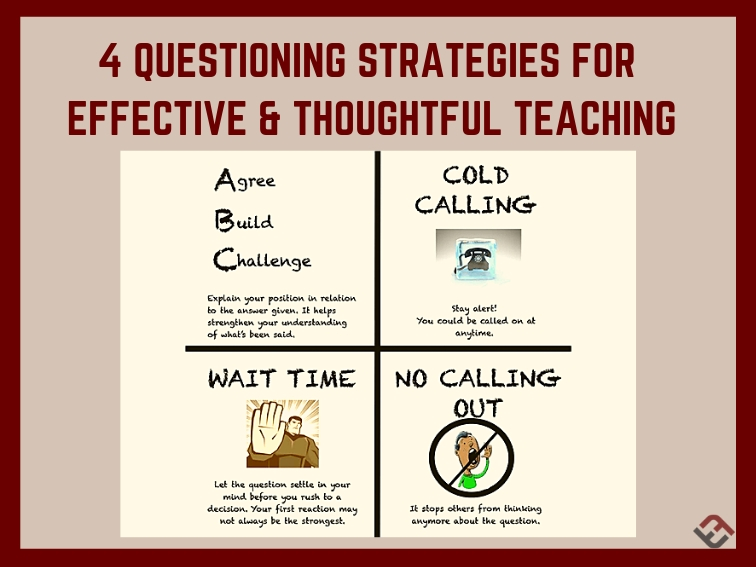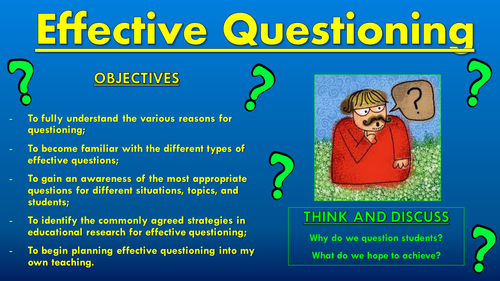Strategies for Effective QuestioningStrategies for Effective Questioning Maximise Responses by. Thirty-six empirical studies on guiding student questioning in primary education were analysed.

Questioning Techniques In The Classroom Video Lesson Transcript Study Com
Is very effective in deepening thoughts as students are asked to either agree with another students response and justify their choice or build on it or disagree with it.

. The 4 key questioning strategies include. Give examples of directed questions being used in the classroom. I dont believe that answer is correct instead of You are wrong.
Asking questions is natural and intuitive. Research-Based Strategies for Teachers. Questioning by teachers in the teaching and learning process is one of the many interactions that occur in the classroom.
It is important for teachers to be able to design different questions to meet different cognitive demands. This study tried to reveal the holistic view about teachers questioning skills. These questioning techniques are ones that I use time and again in my primary school lessons.
Critically reflect on their practice in relation to questioning. Questioning Techniques One of the key components to creating effective teaching and learning processes is the method of questioning or questioning techniques used by teachers. Explain how effective questioning techniques promote learning.
Therefore it is very important to understand the reasons why. Bring in a no-hands policy First I scrapped self-selection. The discussed questioning techniques of Clear Sequence of Questions Contextual Solicitations and Hypothetico-Deductive Questions can increase this response rate to 85 percent and above.
Be quick for pupils to answer one to two minutes. Often they are multiple-choice questions. Ask varying types of questions 2.
Designing higher cognitive questions. The how and why in a students response as opposed to answers which just detail what. Effective Questioning and Classroom Talk.
Questioning is something every teacher does and yet even within my school there are a wide variety of approaches. Effective questioning involves using questions in the classroom to open conversations inspire deeper intellectual thought and promote student-to-student interaction. Recognize the different types of directed classroom questions.
Asking closed questions that have a. Although the educational potential of student questions is widely acknowledged primary school teachers need support to guide them to become effective for learning the curriculum. I am a Key Stage 2 teacher but Ive seen secondary colleagues use similarly questioning in the.
What questioning skills should teachers ask in order to generate maximum interaction among the students. These questions really are crucial to identifying formative progress. Plan to use questions that encourage thinking and reasoning Really effective questions are planned beforehand.
Hinge point questions This simple but effective question approach does what it says on the tin but in terms of progress planning using hinge point questions can be pivotal for formative assessment. Ask non-directing questions 3. Effective questions focus on eliciting the process ie.
Responding to answers - redirecting probing reinforcing. Questioning Skills Class interaction is dependent on the questioning skills. Requiring abstract thinking 7.
Five principles for effective questioning 1. Asking questions forms part of any lesson because it invites the student to think and even within a. Teachers ask an average of 400 questions a day or 70000 a year according to The GuardianWhile many of these questions are generated on the fly asking effective questions by using questioning techniques QTs like those described below prompts deeper answers and engages students in a wide range of critical thinking tasks.
See also Types Of Questions For Teaching Critical Thinking. Be difficult for a pupil to get the right answer for the wrong reasons. Be aware of your teaching presence be mindful of your tone of voice and non-verbal cues eg facial expressions nodding gestures etc if absolutely necessary tactfully correct wrong answers correct the answer not the student.
Designing higher cognitive questions. Until you are quite skilled at classroom questioning you should write your main questions in advance. It isnt something that just happens and teachers need to.
Developing a sequence of questions. 4 Questioning Strategies For Effective Thoughtful Teaching. The questioning examples given are drawn from maths but the principles apply across the curriculum.
Hinge questions are a useful way to check if you need to go over something again. Differentiate between knowledge and comprehension type questions. My current practice is the result of five stages of development.
This is called scripting. Avoid questions that can be answered yes or no unless you are going to follow with more questions to explore reasoning. Research indicates that asking questions is second only to lecturing.
I decided to consider more carefully the questioning techniques in our psychology classroom. Explain why comprehension type questions are critical to assessment. To develop learning higher order thinking promoting imagination speculation creative thinking to pitch a suitable challenge level.
Effective questioning in the classroom can make or break your lesson. Clearly be seen that teachers questioning techniques have not been analyzed with a holistic approach. The first quadrant Agree Build Challenge.
Contain wrong answers that link to common misconceptions. Teachers ask questions from the start of the lesson until the end. Ask questions that require an extended response or at least a content answer.
The aim of this review is to identify which teacher guidance supports effective student questioning. A good questioner of course remains flexible and allows time to follow up responses. Call in non-volunteers 4.
Teachers typically spend anywhere from 35 to 50 percent of their instructional time asking questions. Effective questioning is an aspect of a teachers professional practice that needs to be developed and honed throughout their career. Further teachers who use these find that they are better at.
It is helpful to plan sequences of questions that build on and extend students thinking. Asking open questions that begin with words like What if Explain Analyse Create and compare and contrast etc. Questioning techniques are a heavily used and thus widely researched teaching strategy.

Teaching Strategies How To Use Effective Questioning Techniques Easily To Improve Semantic Memory Youtube

Questioning Strategies For Effective Thoughtful Teaching

Questioning In The Classroom An Updated Guide

7 Effective Questioning Techniques For Teachers Griffin Education Enterprises
What Are Effective Questioning Techniques Teaching Tools

Using Effective Questioning In The Classroom Teacher Help Questioning Techniques Creative Lesson Plans

Effective Questioning Cpd Session Teaching Resources

7 Effective Questioning Techniques For Teachers Griffin Education Enterprises
0 comments
Post a Comment